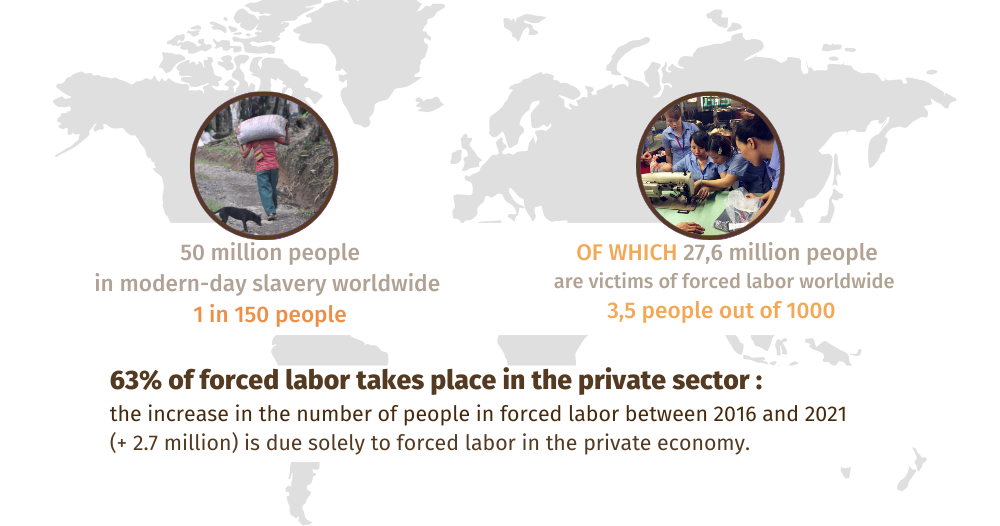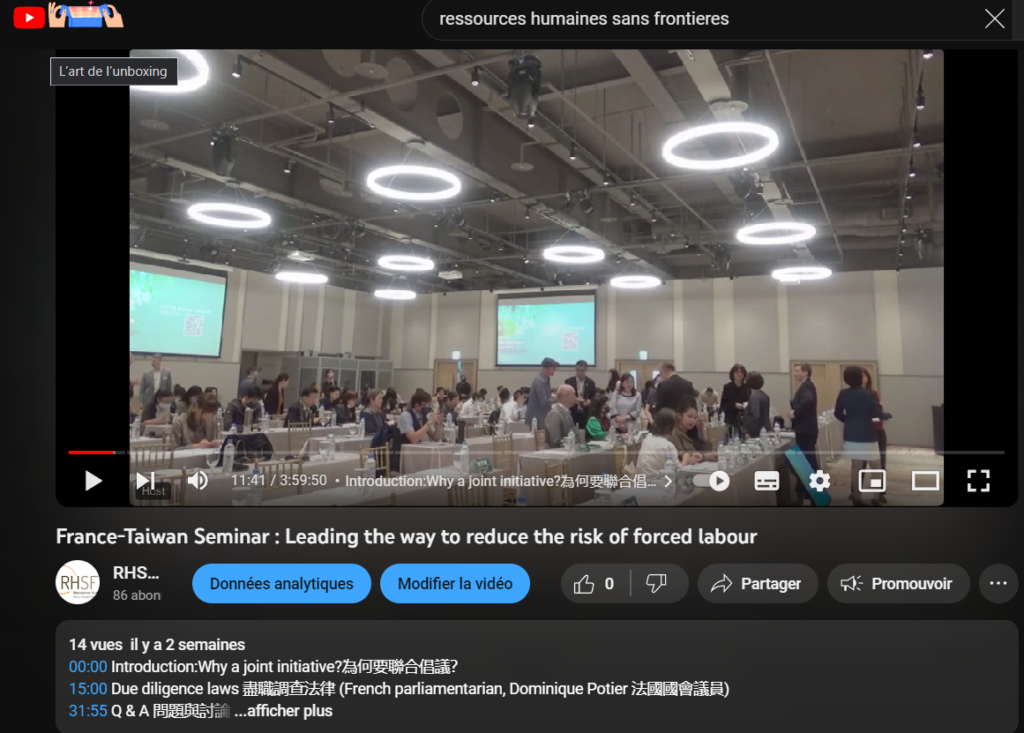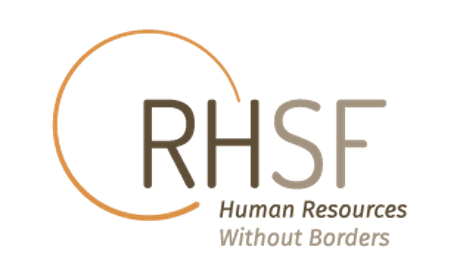“Leading the way to reduce the risk of forced labour: a Franco-Taiwanese partnership supported by RHSF
Published on Oct 31, 2023
The French Office in Taipei and the Taiwanese Ministry of Labour, under the impetus of RHSF, organised a seminar to promote the exchange of knowledge and experience to reduce the risk of forced labour. On 23 October, RHSF co-organised with its local partner, the NGO Serve the People Association (SPA), and with the support of Franco-Taiwanese institutions, a seminar entitled :
«Leading the way to reduce the risk of forced labour: France-Taiwan seminar»
This seminar was an opportunity for RHSF and the participants to explain the complexity of the subject and to launch a call for action to continue the dialogue and seek concrete avenues for action as part of a collective intelligence approach.
This event took place as part of RHSF’s “Lab 8.7” action-research programme.
| The “Lab 8.7” action-research program: analyze, test, share Created and piloted by RHSF in partnership with the French Ministry of Europe and Foreign Affairs (MEFA), the “Lab. 8.7″* is a unique example of the partnership approach that is essential between public authorities, business and civil society to achieve the goal of decent work for all. In fact, the Lab responds to an observation made by RHSF in the field: in the fight against child labor and forced labor, each of the stakeholders (companies, investors, consumers, governments…) holds part of the solution. And the impetus must come from each of them, at the highest level of the hierarchy, and above all through a common approach. The “Lab 8.7” program is designed to test innovative employment practices among subcontractors, in collaboration with volunteer companies. As an action-research program, it also provides an academic framework for RHSF’s experiments, giving everyone time to explore original solutions before sharing them with as many people as possible, in the general interest. |
In globalized supply chains, the practices of client companies, as well as those of local businesses, recruitment agencies, intermediaries and public institutions, combine to create situations of forced labor.
Forced Labour :

The process of cooperation between different players : a gradual step forward in the fight against forced labour
Each stakeholder does not always understand the interests of the others. These difficulties keep migrant workers in a highly vulnerable position. To combat this situation effectively, as part of the “Lab 8.7” action-research program, and at the instigation of the Secretary General of the French Ministry of Foreign Affairs, French business leaders and investors with interests abroad have committed to a long-term change in December 2022.
Indeed, the duty of vigilance against forced labor is difficult to implement in the face of such complex situations. This change requires us to co-construct with local and non-local players throughout the supply chains: companies, investors, civil society organizations, trade unions, Taiwanese civil servants, French and foreign officials.
Help the various players in the supply chain to identify and overcome obstacles
Situations have been identified with companies and investors which are not only the result of a single customer or local company, but also of an entire foreign recruitment system. It is in these situations, where several players play a role simultaneously, that a collective and coordinated effort is required..
The aim of this seminar was to understand the points of view of each stakeholder in order to coordinate a joint initiative where everyone can act at their own level to reduce exposure to forced labor of workers, and more particularly migrants. A progressive approach, taking into account the interests and concerns of each stakeholder, is one possible way of sustainably reducing this exposure.
The member of Parliament Potier, who is responsible for France’s “duty of vigilance” law, explained to participants the spirit of this text, which is a risk-prevention law for the most vulnerable.
A migrant worker from the Philippines shared her experience and her migratory journey to Taiwan. RHSF and SPA gave a global view of forced labor situations in Taiwan, which often begin in the workers’ countries of origin.
French investor Amundi and Schneider Electric in Taiwan also shared their expectations and difficulties in dealing with forced labor issues, while the Malaysian pilot company in RHSF’s “RéSolutions” project was invited to present its experimental solutions, implemented with RHSF, as well as the obstacles encountered and opportunities.

To encourage group action in the fight against forced labor, academic, civil organization and governmental viewpoints were included in the discussions. In the end, around a hundred people attended the seminar in Taipei.
The result was a successful seminar for sharing ideas, exchanging knowledge and skills, so that everyone came away having learned to identify the bottlenecks and levers for action in the fight against forced labor.
The seminar was an opportunity for RHSF to launch a call to action so that the players present could understand the subject and decide to commit themselves, each at their own level, to combating forced labor in their practices. From now on, RHSF will continue to mobilize the players concerned to pursue the dialogue and seek concrete avenues for action in a collective intelligence approach.
To find out more about the “Taiwan” project, please contact the Asia Project Manager, Aziz Ahammout, at aziz.ahammout@rhsansfrontieres.onmicrosoft.com.

You can watch the entire seminar on our Youtube channel. You can also find the afternoon’s program below.
“Leading the way to reduce the risk of forced Labour” – Program
| Welcoming Session | ||
| Preliminary remarks | Introduction : Why a joint initiative? | Minister of Labor + Director of the French Office in Taipei |
| Part 1 | Reasonable duty of care laws : Why are these laws enacted, and in what spirit? Interview with French MP Dominique Potier, who was rapporteur for the French law on due diligence and evaluated it five years after its adoption. He is also working on the European law on duty of care. | Dominique Potier, French MP (en duplex depuis Paris) |
| Workers’ perspectives : Testimony of a migrant worker in the manufacturing sector. | SPA (including the testimony of a migrant worker) | |
| The point of view of migrant worker host organizations : What conclusions can be drawn from years of hosting migrant workers, what are the realities that workers don’t talk about and that civil society organizations can help to make heard. | ||
| The realities of recruitment and migration : Presentation of a study on migrants’ journeys from their home villages in Indonesia to host countries such as Taiwan. | RHSF | |
| Forced labor systems : 11 indicators defined by the ILO (International Labor Organization) divided into 4 key categories: 4 main concerns for all (Consent, Restraint, Isolation, Freedom of movement). | ||
| Questions and answers – Part 1 | ||
| Break | ||
| Part 2 | Perspectives from French investors : What are their expectations, why is it important for them to work in depth on the subject? | A French investor, Amundi LE MEAUX, Caroline – Global Head of ESG Research, Engagement and Voting (duplex from Paris) |
| Perspectives from French corporate customers : What are the challenges and decisions that French companies face as international corporate customers? Why is it important for them to work in depth on this subject? | A French customer, Schneider Electric KUO, Sylvia – Managing Director, Schneider Electric Taiwan | |
| Perspectives from supply chain companies recruiting workers : Testimony from a Malaysian supplier recruiting migrant workers from the same countries as Taiwan (they will explain the challenges and opportunities while experimenting with prevention solutions as part of the Lab 8.7 program run by the RHSF). | Malaysian supplier, Polycore Optical M SHANMUGAM-DALVINDER, Cynthia – Director, Polycore Optical (M) Sdn Bhd | |
| Perspectives from public institutions : Conclusions on existing recruitment and migration systems: challenges and opportunities for better prevention for workers. | MOL | |
| Taking action: building capacity Feedback on stakeholder practices in the field. Reducing people’s exposure to forced labor means first understanding how each stakeholder contributes to it. | RHSF + SPA | |
| Questions and answers – Part 2 | ||
| Concluding remarks | Commitment and call to commitment : Conclusion | Minister of Labor + Director of the French Office in Taipei |
| Networking session and closing | ||
*The “Lab 8.7” was launched by RHSF in 2020, following the establishment by the UN of the “Alliance 8.7” global partnership. The partnership was named after target 8.7 of the UN’s Sustainable Development Goals (SDGs), which aims to eradicate child labour by 2025 and forced labour by 2030.



